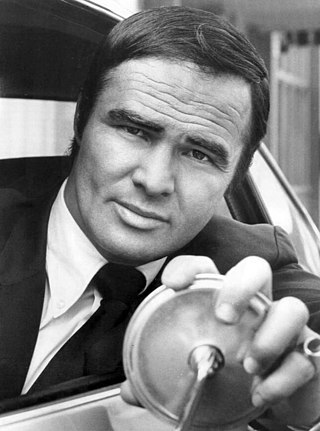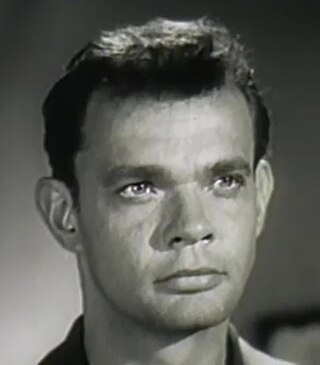
Hawaii Five-O is an American police procedural drama series produced by CBS Productions and created by Leonard Freeman. Set in Hawaii, the show originally aired for 12 seasons on CBS from September 20, 1968, to April 5, 1980, and continues in reruns. At the airing of its last episode, it was the longest-running police drama in American television history, and the last scripted primetime show that debuted in the 1960s to leave the air.

Richard Allen Boone was an American actor who starred in over 50 films and was notable for his roles in Westerns, including his starring role in the television series Have Gun – Will Travel.

Victor Tayback was an American actor. He was best known for his role as diner owner Mel Sharples on the television sitcom Alice (1976–1985), as well as his multiple guest appearances on The Love Boat (1977–1987). The former earned him two consecutive Golden Globe Awards and a Primetime Emmy Award nomination for Outstanding Continuing Performance by a Supporting Actor in a Comedy Series.

Vera June Miles is an American retired actress. She is known for appearing in John Ford's Western films The Searchers (1956) and The Man Who Shot Liberty Valance (1962), and for playing Lila Crane in Alfred Hitchcock's Psycho (1960) and Richard Franklin's sequel Psycho II (1983).

Pernell Elven Roberts Jr. was an American stage, film, and television actor, activist, and singer. In addition to guest-starring in over 60 television series, he was best known for his roles as Ben Cartwright's eldest son Adam Cartwright on the Western television series Bonanza (1959–1965), and as chief surgeon John McIntyre, the title character on Trapper John, M.D. (1979–1986).

Anthony Eisley was an American actor best known as one of the detective leads, Tracy Steele, in the ABC/Warner Brothers television series Hawaiian Eye. Early in his career, he was credited as Fred Eisley and later was sometimes billed as Tony Eisley.

Douglas Osborne McClure was an American actor whose career in film and television extended from the 1950s to the 1990s. He is best known for his role as the cowboy Trampas during the entire run from 1962 to 1971 of the series The Virginian and mayor turned police chief Kyle Applegate on Out of This World. From 1961 to 1963, he was married to actress BarBara Luna.

Stefan Ihnat was a Slovak-born American actor and director.
Andrew Victor McLaglen was a British-born American film and television director, known for Westerns and adventure films, often starring John Wayne or James Stewart.

Ford Rainey was an American film, stage, and television actor.

Roy Cameron Jenson, also known and credited as Roy Jensen, was a Canadian American football player, stuntman, and actor.

James Farentino was an American actor. He appeared in television, film, and on stage, including The Final Countdown, Jesus of Nazareth, and Dynasty.

Leslie Irving Morrow, known as Jeff Morrow, was an American actor.

Dan August is an American drama series that aired on ABC from September 23, 1970, to April 8, 1971. Burt Reynolds played the title character. Reruns of the series aired in prime time on CBS from May to October 1973 and from April to June 1975.

Banyon is a detective series broadcast in the United States by NBC as part of its 1972–73 television schedule, though a standalone two-hour television movie was broadcast first in March 1971. The series was a Quinn Martin Production, the first-ever show Martin made for the NBC network, though he did not produce the pilot.

Ernest Lamont Johnson Jr. was an American actor and film director who appeared in and directed many television shows and movies. He won two Emmy Awards.

Lizzie is a 1957 American film noir drama film directed by Hugo Haas. The film is based on the 1954 novel The Bird's Nest by Shirley Jackson and stars Eleanor Parker, Richard Boone and Joan Blondell. The popular songs "It's Not for Me to Say" and "Warm and Tender" were written for this film, and performed by Johnny Mathis, who played a piano player/singer in the film. The film was produced by MGM Studios.

Christmas Eve is a 1947 American portmanteau comedy drama film directed by Edwin L. Marin and starring George Raft, George Brent and Randolph Scott. It is based on a story by Laurence Stallings and Richard H. Landau. An independent production by Benedict Bogeaus it was distributed by United Artists. It was re-released under the alternative title Sinner's Holiday. It was one of several films Raft made with Edwin Marin and Benedict Bogeaus.

Hugh Hefner: Playboy, Activist and Rebel is a 2009 documentary film directed by Brigitte Berman about Hugh Hefner, creator of Playboy magazine. Berman previously directed the Academy Award-winning documentary Artie Shaw: Time Is All You've Got.

Sidney Murray Matheson was a U.S.-based Australian actor. He appeared on stage and in films and television programs until 1983.



















